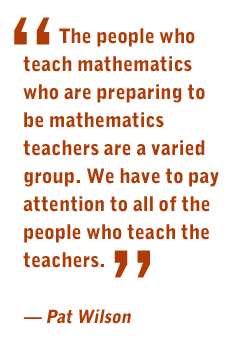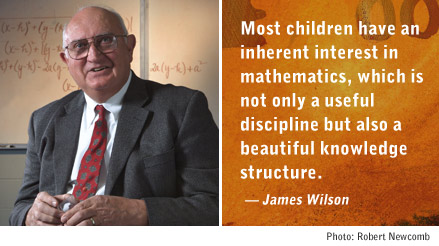


Building a Better Math Teacher
by Frank Stephenson
Intro
| Goal One: Teacher Quality/ Look Beyond the Ed Schools
| Toward a Deeper Understanding/ Show Us the Money


Goal One: Teacher Quality
Since that dismal assessment 25 years ago, the situation hasn’t improved much, if at all. A 2004 survey done by the Brookings Institution’s Brown Center on Education Policy showed that only 22 percent of the nation’s 16,000 middle-school math teachers majored in mathematics in college. Only 41 percent possessed specific teaching credentials or certificates in math.
The findings reinforce critical assessments of how and what the nation’s math teachers are being taught. The result is that too many teachers are walking into math classrooms ill equipped to teach the subject, simply because there aren’t enough qualified teachers to meet the demand.
“School districts have to use people who aren’t certified in math, who have not had math training and aren’t prepared to be math teachers,” said Jeremy Kilpatrick, a Regents Professor at the University of Georgia who is among the country’s foremost researchers on K-12 mathematics education. “But what’s a principal to do? You’ve got a class full of kids who need to be taught algebra and you don’t have any more algebra teachers, so you hire somebody — anybody — to teach those kids algebra, and that person may not know a thing about algebra. It’s a scandal.”
Kilpatrick is now part of a national effort, based at UGA and the University of Michigan, aimed specifically at improving the mathematics knowledge and skills of math teachers. His colleague, Pat Wilson, also a professor in UGA’s Department of Mathematics and Science Education, is team leader and principal investigator of a five-year, $10.3 million, National Science Foundation initiative with this as its principal goal. Wilson, Kilpatrick, and professor of mathematics and science education James Wilson (no relation) are the UGA contingent of leadership for the project run jointly by the two universities.
The NSF and other federal agencies are tackling this enormously complex dilemma — poor math performance among the nation’s school kids — from many varied perspectives. However, the UGA-Michigan project is focused exclusively on “finding out how to create the most proficient teachers possible,” Pat Wilson said. Because of the project’s unique focus, the NSF has made UGA’s Center for Proficiency in Teaching Mathematics (CPTM) part of their Centers for Learning and Teaching program, which established CPTM as a national endeavor.

Look Beyond the Ed Schools
For years, critics of the preparation of math teachers have been quick to single out the nation’s colleges of education as the chief culprit. The 1983 At Risk report fired its own salvo at these schools, citing a survey of 1,350 teacher-training institutions where elementary-school teacher candidates spent more than 40 percent of their time taking required courses in things other than mathematics.
Wilson said that her center, by contrast, isn’t singling out education colleges. “Our focus is much broader than that. The people who teach mathematics to students who are preparing to be mathematics teachers are a varied group. We have to pay attention to all of the people who teach the teachers.”
Typically, graduates of programs in colleges of education who intend to teach in a particular subject area — mathematics and science in particular — get instruction not only from within their education departments but also from mathematicians and scientists in colleges of arts and sciences. Oftentimes, these teachers of would-be math teachers don’t have a good grasp of the kinds of mathematics their students really need to be effective instructors in K-12 classrooms, Wilson said.
Another important group, often overlooked, is the practicing teachers themselves. “We have studies that say that some teachers are learning the mathematics they need for teaching on the job. That may not be all bad,” she said, “especially if by so doing you’re developing broader and more mature insights into the subject. But school district leaders need to do all they can to provide these teachers with an opportunity for continuing education and professional development.”
Intro
| Goal One: Teacher Quality/ Look Beyond the Ed Schools
| Toward a Deeper Understanding/ Show Us the Money
For comments or for information please e-mail: rcomm@uga.edu
To contact the webmaster please email: ovprweb@uga.edu
![]()